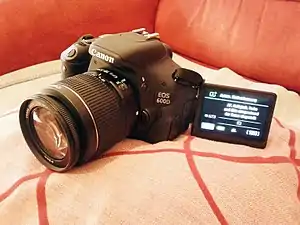Canon EOS 600D
The Canon EOS 600D is an 18.0 megapixel digital single-lens reflex camera, released by Canon on 7 February 2011.[1] It is known as the EOS Kiss X5 in Japan and the EOS Rebel T3i in America. The 600D is the second Canon EOS camera with an articulating LCD screen and supersedes the 550D, although the earlier model was not discontinued until June 2012, when the successor of the 600D, the 650D, was announced.
 | |
| Overview | |
|---|---|
| Type | Digital single-lens reflex camera |
| Lens | |
| Lens | Canon EF lens mount, Canon EF-S lens mount |
| Sensor/medium | |
| Sensor | CMOS APS-C 22.3 × 14.9 mm (1.6x conversion factor) |
| Maximum resolution | 5,184×3,456 (18.0 effective megapixels) |
| Film speed | ISO 100 to 6400 (expandable to 12800) |
| Storage media | Secure Digital Card Secure Digital High Capacity Secure Digital Extended Capacity |
| Focusing | |
| Focus modes | AI Focus, One-Shot, AI Servo, Live View |
| Focus areas | 9 AF points, (f/5.6 cross type at centre, extra sensitivity at f/2.8) |
| Exposure/metering | |
| Exposure modes | Scene Intelligent Mode (or Full Auto), Portrait, Landscape (Daylight, Shade, Cloudy, Sunset, Default setting), Close-up, Sports, Night Portrait, No Flash, Program AE, Shutter-priority, Aperture-priority, Manual, Auto Depth-of-field, Movie |
| Exposure metering | Full aperture TTL, 63-zone SPC |
| Metering modes | Evaluative, Spot (4% at center), Partial (9% at center), Center-weighted average |
| Flash | |
| Flash | E-TTL II automatic built-in pop-up |
| Flash bracketing | Yes |
| Shutter | |
| Shutter | focal-plane |
| Shutter speed range | 1/4000 to 30 sec and bulb, 1/200 s X-sync |
| Continuous shooting | 3.7 frame/s for 34 JPEG or 6 raw frames |
| Viewfinder | |
| Viewfinder | Eye-level pentamirror SLR, 95% coverage, 0.85× magnification, and electronic (Live View) |
| Image processing | |
| White balance | Auto, Daylight, Shade, Cloudy, Tungsten, Fluorescent, Flash, Custom |
| WB bracketing | +/- 3 stops for 3 frames |
| General | |
| LCD screen | 3 in 3:2 color TFT LCD, 1,040,000 dots, articulated |
| Battery | LP-E8 Lithium-Ion rechargeable battery |
| Optional battery packs | BG-E8 grip |
| Dimensions | 133.1 mm × 99.5 mm × 79.7 mm |
| Weight | 560 g (20 oz) (including battery and card) |
| Made in | Taiwan/Japan |
Feature list
- 18.0 effective megapixel APS-C CMOS sensor
- Full HD 1080p video recording at 24/25/30 frame/s
- HD 720p video recording at 50/60 frame/s
- 3–10× Digital Zoom in video recording (available only in 1080p).
- One reviewer concluded that this feature takes a 1920×1080 crop from the middle of the sensor frame for the "3×" zoom, but was unable to confirm this with Canon.[2] This feature has not been included in any subsequent models of the Rebel line, or in the EOS M mirrorless camera, but returned with the 2013 release of the EOS 70D.
- DIGIC 4 image processor
- 14-bit analog to digital signal conversion
- 3.0-inch (76 mm) Vari-angle 3:2 aspect ratio LCD articulating screen.
- Live view mode
- Built in flash with Speedlite wireless multi-flash support
- 9 point AF with centre cross-type sensor sensitive at f/2.8
- Four metering modes, using 63 zones: spot, partial, center-weighted average, and evaluative metering.
- Highlight tone priority
- EOS integrated cleaning system
- sRGB and Adobe RGB colour spaces
- ISO 100–6,400 expandable to 12,800
- Continuous drive up to 3.7 frame/s (34 images (JPEG), 6 images (raw))
- SD, SDHC, and SDXC memory card file storage
- RAW and large JPEG simultaneous recording
- Eye-Fi support
- USB 2.0, HDMI interface
- LP-E8 battery
Video
As with many DSLRs (and unlike the SLT cameras), the 600D lacks continuous auto-focus while filming video. To keep a moving subject in focus the user must either trigger the auto-focus (as when shooting stills), or track the subject's motion manually.
Successor
The successor of Canon EOS 600D was the Canon EOS 650D, equipped with a newly developed Hybrid CMOS sensor that enabled full-time AF during video and live-view mode, and had a multi-touch vari-angle display for one-touch shooting. The DIGIC V image processor gave 5 fps of continuous shooting speed and enabled the capture of HDR images with just one click of the shutter button. The Canon 650D also came with a multi-frame NR mode and Handheld Night Scene mode. DPReview praised its innovative touchscreen, but also pointed out that with regard to auto-focussing in live view mode the 650D was "still far behind the better mirrorless models we have seen from the likes of Panasonic and Olympus as well as rival Nikon's 1 series".[4]
See also
- Canon EF lens mount
- Canon EF-S lens mount, a subset of the EF mount designed for cameras with APS-C sensors such as the 600D
- Comparison of Canon EOS digital cameras
References
- "Canon Rebel T3i / EOS 600D announced and previewed". Digital Photography Review. 7 February 2011. Retrieved 7 February 2011.
- Laing, Gordon (April 2011). "Canon EOS 600D / Rebel T3i Movie Mode". CameraLabs.com. Retrieved 4 September 2011.
- Laing, Gordon (April 2011). "Canon EOS 600D / Rebel T3i design and controls". CameraLabs.com. Retrieved 16 October 2011.
- "Canon EOS 650D/Rebel T4i In-Depth Review, Conclusion". DPReview. Retrieved 4 September 2015.
External links
 Media related to Canon EOS 600D at Wikimedia Commons
Media related to Canon EOS 600D at Wikimedia Commons- Canon 600D Product Page at Canon USA